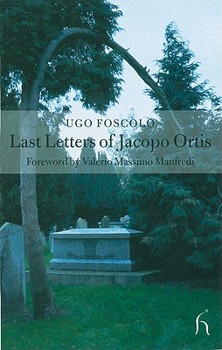Last Letters of Jacopo Ortis and of Tombs
Select Format
Select Condition 
Book Overview
A unique edition of a masterly prose work by one of Italy's most celebrated poets, and perhaps the greatest Italian novel of the Romantic movement. Saddened with his country's loss of freedom,... This description may be from another edition of this product.
Format:Paperback
Language:English
ISBN:1843910020
ISBN13:9781843910022
Release Date:July 2002
Publisher:Hesperus Press
Length:176 Pages
Weight:0.50 lbs.
Dimensions:0.5" x 4.9" x 7.9"
Customer Reviews
1 rating
Romantic whining of the most enjoyable kind
Published by Thriftbooks.com User , 20 years ago
While I cannot say that this book is for everybody, fans of Italian literature and those interested in colossally contradictory attitudes will be thrilled. Jacopo Ortis, a young romantic (Romantic with a capital R, as you'll see) manages to wallow whole heartedly in every imaginable feeling of alienation, exile, painful love, pessimism regarding man and nature, suicide, weakness that he can muster-- and muster them he does in his venomous letters to his friend. From the beginning, we realize that this guy isn't going to be around long. A love affair (not unrequited, surprisingly enough) with a woman named Teresa drives him to the extremities of self hatred, self recrimination, and self destruction. He alternately claims that all society is constructed on illusion, and yet goes on page-length rants about the singular beauty of Italy and its unjust occupation by whoever. In the tradition of Leopardi, he dissects every human belief as comforting illusion, all while feeling that there are sufficient reasons for him to off himself and exalting morality. Jacopo is a confused guy, but manages to cast a strange spell over others--Teresa's father, for instance. He exudes the sanctimonious air of a priest. This is literature, of course.The end is predictable. It is truly a touching work, but there is a point past which Jacopo's rantings become both depressing and annoying. Now we know why Nietzsche couldn't stand Rosseau. Still, there is a delicious self indulgent, tragic touch to it.





